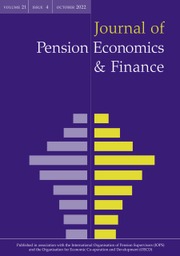Article contents
Preferences for redistribution and pensions. What can we learn from experiments?
Published online by Cambridge University Press: 11 February 2013
Abstract
Redistribution is an inevitable feature of collective pension schemes and economic experiments have revealed that most people have a preference for redistribution that is not merely inspired by self-interest. However, little is known on how these preferences interact with preferences for different pension schemes. In this paper, we review the experimental evidence on preferences for redistribution and suggest some links to redistribution through pensions. For that purpose we distinguish between three types of situations. The first deals with distributional preferences behind a veil of ignorance. In the second type of situation, individuals make choices in front of the veil of ignorance and know their position. Finally, we discuss situations in which income is determined by interdependent rather than individual choices. In the closing sections of the paper, we discuss whether and how these experimental results speak to the redistribution issues of pensions. For example, do they argue for or against mandatory participation? Should we have less redistribution and more actuarial fairness? How does this depend on the type of redistribution involved?
- Type
- Articles
- Information
- Copyright
- Copyright © Cambridge University Press 2013
References
- 9
- Cited by


